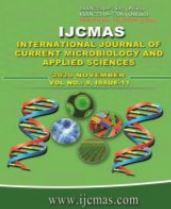


 National Academy of Agricultural Sciences (NAAS)
National Academy of Agricultural Sciences (NAAS)

|
PRINT ISSN : 2319-7692
Online ISSN : 2319-7706 Issues : 12 per year Publisher : Excellent Publishers Email : editorijcmas@gmail.com / submit@ijcmas.com Editor-in-chief: Dr.M.Prakash Index Copernicus ICV 2018: 95.39 NAAS RATING 2020: 5.38 |
The biological experiment was carried out with a total of five hundred and twenty five day old straight-run Japanese quail chicks up to 5 weeks of age. At the end of five weeks post hatch growth performance study, six birds from each treatment group were drawn randomly and subjected to humane method of slaughter. The study was conducted to assess the carcass yield on post-hatch performance of Japanese quail as influenced by supplementing Omega-3 PUFA rich oil sources like fish oil and linseed oil, independently and simultaneously at 2 and 4 per cent levels. The parameters like eviscerated carcass yield and the giblets weight viz. heart, liver and gizzard were recorded. Breast meat samples were collected from each carcass and stored at -20ºC for the estimation of sensory evaluation to assess the meat quality characteristics. The results of this study concluded that the effect of Omega-3 PUFA rich oils at different levels had no significant influence on ready-to-cook yield and eviscerated yield due to treatment. Also, the effect of PUFA rich oil supplementation at different levels did not alter the per cent giblets yield and the weight of heart, gizzard and liver significantly. The inclusion of omega-3 lipid sources in Japanese quail ration had no adverse effect on meat quality in terms of organoleptic assessment such as appearance, juiciness, flavour, tenderness and overall acceptability scores.
 |
 |
 |
 |
 |